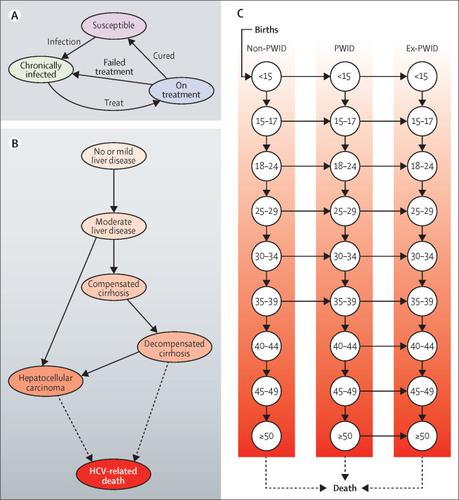The Lancet Global Health ( IF 19.9 ) Pub Date : 2019-12-18 , DOI: 10.1016/s2214-109x(19)30483-8 Josephine G Walker 1 , Tinatin Kuchuloria 2 , David Sergeenko 3 , Hannah Fraser 1 , Aaron G Lim 1 , Shaun Shadaker 4 , Liesl Hagan 4 , Amiran Gamkrelidze 5 , Valeri Kvaratskhelia 3 , Lia Gvinjilia 2 , Malvina Aladashvili 6 , Alexander Asatiani 5 , Davit Baliashvili 7 , Maia Butsashvili 8 , Ivdity Chikovani 9 , Irma Khonelidze 5 , Irma Kirtadze 10 , Mark H Kuniholm 11 , David Otiashvili 12 , Lali Sharvadze 13 , Ketevan Stvilia 5 , Tengiz Tsertsvadze 6 , Mamuka Zakalashvili 14 , Matthew Hickman 1 , Natasha K Martin 15 , Juliette Morgan 16 , Muazzam Nasrullah 4 , Francisco Averhoff 4 , Peter Vickerman 1

|
Background
Georgia has a high prevalence of hepatitis C, with 5·4% of adults chronically infected. On April 28, 2015, Georgia launched a national programme to eliminate hepatitis C by 2020 (90% reduction in prevalence) through scaled-up treatment and prevention interventions. We evaluated the interim effect of the programme and feasibility of achieving the elimination goal.
Methods
We developed a transmission model to capture the hepatitis C epidemic in Georgia, calibrated to data from biobehavioural surveys of people who inject drugs (PWID; 1998–2015) and a national survey (2015). We projected the effect of the administration of direct-acting antiviral treatments until Feb 28, 2019, and the effect of continuing current treatment rates until the end of 2020. Effect was estimated in terms of the relative decrease in hepatitis C incidence, prevalence, and mortality relative to 2015 and of the deaths and infections averted compared with a counterfactual of no treatment over the study period. We also estimated treatment rates needed to reach Georgia's elimination target.
Findings
From May 1, 2015, to Feb 28, 2019, 54 313 patients were treated, with approximately 1000 patients treated per month since mid 2017. Compared with 2015, our model projects that these treatments have reduced the prevalence of adult chronic hepatitis C by a median 37% (95% credible interval 30–44), the incidence of chronic hepatitis C by 37% (29–44), and chronic hepatitis C mortality by 14% (3–30) and have prevented 3516 (1842–6250) new infections and averted 252 (134–389) deaths related to chronic hepatitis C. Continuing treatment of 1000 patients per month is predicted to reduce prevalence by 51% (42–61) and incidence by 51% (40–62), by the end of 2020. To reach a 90% reduction by 2020, treatment rates must increase to 4144 (2963–5322) patients initiating treatment per month.
Interpretation
Georgia's hepatitis C elimination programme has achieved substantial treatment scale-up, which has reduced the burden of chronic hepatitis C. However, the country is unlikely to meet its 2020 elimination target unless treatment scales up considerably.
Funding
CDC Foundation, National Institute for Health Research, National Institutes of Health.
中文翻译:

乔治亚州丙型肝炎消除计划的中期效果评估:模型研究。
背景
乔治亚州丙型肝炎患病率很高,5·4% 的成年人患有慢性感染。 2015 年 4 月 28 日,格鲁吉亚启动了一项国家计划,通过扩大治疗和预防干预措施,到 2020 年消除丙型肝炎(患病率降低 90%)。我们评估了该计划的中期效果以及实现消除目标的可行性。
方法
我们开发了一个传播模型来捕捉佐治亚州丙型肝炎的流行情况,并根据注射吸毒者生物行为调查(PWID;1998-2015)和全国调查(2015)的数据进行校准。我们预测了截至 2019 年 2 月 28 日施用直接抗病毒治疗的效果,以及截至 2020 年底继续当前治疗率的效果。效果是根据丙型肝炎发病率、患病率和感染率的相对下降来估计的。与 2015 年相比的死亡率以及与研究期间未接受治疗的反事实相比所避免的死亡和感染情况。我们还估计了达到格鲁吉亚消除目标所需的治疗率。
发现
从2015年5月1日到2019年2月28日,共治疗了54 313名患者,自2017年中期以来每月治疗约1000名患者。与2015年相比,我们的模型预测这些治疗将成人慢性丙型肝炎的患病率降低了中位数 37%(95% 可信区间 30-44),慢性丙型肝炎发病率降低 37% (29-44),慢性丙型肝炎死亡率降低 14% (3-30),并预防了 3516 例 (1842-6250)新增感染并避免了 252 例 (134-389) 例与慢性丙型肝炎相关的死亡。每月对 1000 名患者进行持续治疗预计可将患病率降低 51% (42-61),发病率降低 51% (40-62)。到 2020 年底。要到 2020 年减少 90%,治疗率必须增加到每月 4144 名 (2963–5322) 名患者开始治疗。
解释
格鲁吉亚的丙型肝炎消除计划已大幅扩大治疗规模,减轻了慢性丙型肝炎的负担。然而,除非大幅扩大治疗规模,否则该国不太可能实现 2020 年消除丙型肝炎的目标。
资金
疾病预防控制中心基金会、国家健康研究所、美国国立卫生研究院。











































 京公网安备 11010802027423号
京公网安备 11010802027423号